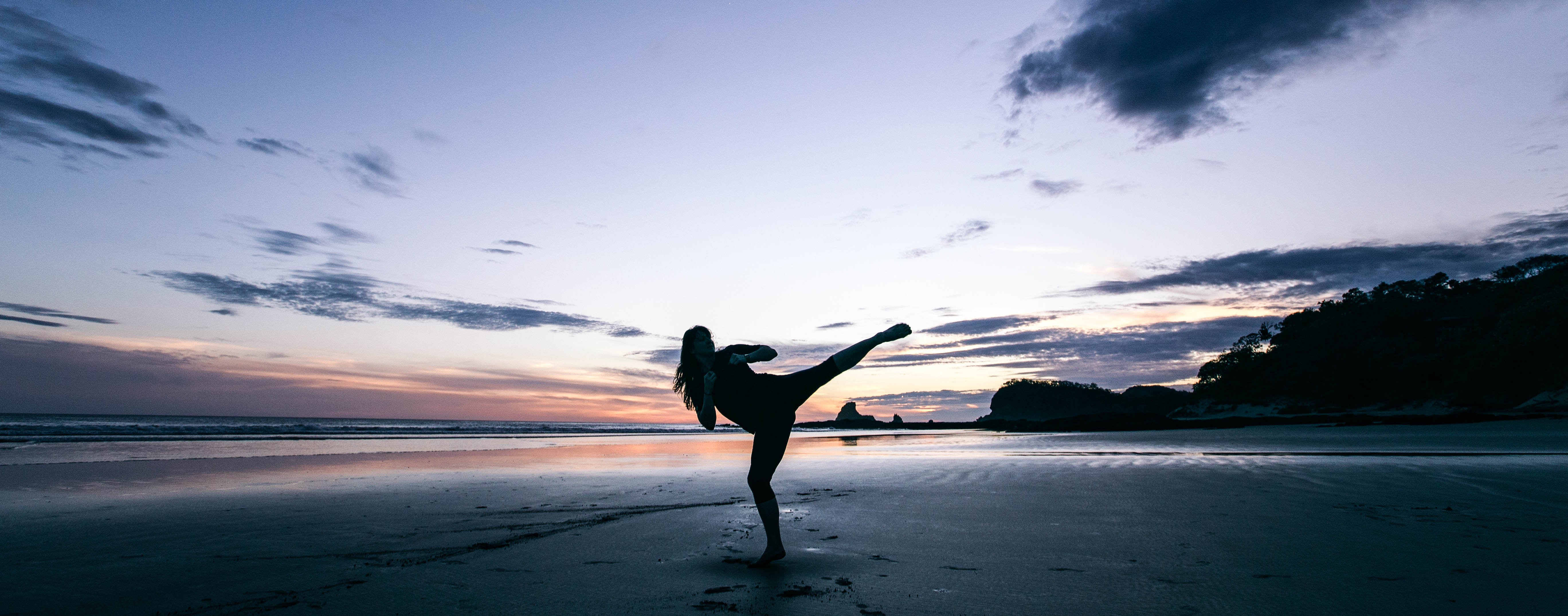The Spy Who Loved Us - An Intelligence Operative's Rules For Survival
SOFLETE launched in 2015 with a homemade website and a 90 day fitness program in a PDF. We didn’t know what we were doing, and nothing happened unless we did it ourselves. This included answering every email we received.
One of those early emails came from a customer who was looking for recommendations on how to choose a martial arts coach to compliment SOFLETE’s fitness program. As we discussed her goals, it became clear that her work in the Intelligence Community required her to be self reliant, both physically and mentally. In stark contrast to SOF personnel, she had not received any training or guidance from her employer about how to keep herself in a state of physical readiness.
Furthermore, her job required that she be able to perform at a high physical level without attracting unnecessary attention to herself through anything that would cause her to be extra memorable, such as an extremely athletic physique.
What follows is her thoughts about the above, after three years of self exploration, experimentation, and following SOFLETE training programs. May her hard won lessons serve as guidance and wisdom for those who follow in her untraceable footsteps.

I’m part of that OG cohort of young recruits who were in DC on 9/11. My entry into the Intelligence Community was a fire drill; a sort of shell-shocked mix of earnest duty and eat-your-face-off rage. My training was so quick that I’m not really even sure it happened. There was war to wage, which meant that there was no time for pull-up tests or jiu-jitsu primers. Within weeks, I was bumping along a faraway land on a train with strange people from stranger agencies.
Since then, I have spent close to two decades working overseas, first for the Intelligence Community and now the private sector. Even as I write this, I’m sitting in a coffee shop in the lobby of a hotel in Mexico City, greyed out against the background of this bustling metropolis.
You Only Live Twice
For most of my career, I was not consistently training the body that was carrying around my highly-trained brain. My view of physicality was solely focused on aesthetics, looking good, not tactical performance.
With some natural athleticism and a highly competitive track record, I deluded myself into thinking that when tested, I’d dig deep, instincts would kick in, and I’d be able to tap an emergency cache of superhuman abilities. All my years of luck tricked me into thinking I was exceptional. I would survive when most others wouldn’t.
That was bullshit.
My abilities were shallow and my physical training willy-nilly, unfocused, and unintelligent.
On top of all that, I’ve got some cards stacked against me. I’m a woman and I’m getting older. Both are additional challenges to keeping my head attached.
Skyfall
In 2015, a man in the Middle East called me on my bullshit. In what should have been a benign moment in a foreign capitol, a thing happened. At that moment I became acutely aware that I lacked directional physical power. I had zero hand-to-hand combat skills under duress. And moving quickly in a head-to-toe abaya with no peripheral vision is stupid hard.
When I got back to the States, I reached out to SOFLETE HQ for some counsel. They answered, and I was off to the races. That decision to trust SOFLETE was the beginning of a number of paradigm shifts in my training as well as in the way I now float through the world.
Here’s what I’ve learned over the last three years as I’ve worked hard to correct my mistakes and prepare my mind and body for the rigors of holding my own among powerful politicians and businessmen to protecting myself in developing countries, and everything in between.

Tomorrow Never Dies
Like many of you I came here for the training, because the tone and tenor of that training is fully about keeping myself safe and alive. In practice though, my work is vastly different from the teams-based, offensive, tactical requirements of an operator.
We know our goals should drive our training program design, but I struggled to pinpoint what aids me in optimal defensive survival against hostile actors across many countries. Bad guys are different in Colombia, Kabul, and Kursk.
I kept asking myself: What the hell do I need to be good at? What’s the roadmap here?
Mostly, it felt like I needed to be good at everything.
When looking at the fitness industry, there’s no obvious home for people like me. Mainstream bodybuilding/bikini programming is nonsense. The attention grabbing aesthetic of a bikini model is a liability for me, and that style of training is not performance oriented. Crossfit felt irrelevant to me - plus I couldn’t get over a gym full of strangers monitoring my travels. There’s loads of MIL/LE programming out there, but so much of it seemed heartily focused on testing or selection. Sport specific training programs, such as OCR training, S&R training, Mountaineering, etc, seemed too niche focused.
A hundred times I thought, “Fuck me, I’ve got enough on my plate. I don’t have time to give myself a pseudo degree in training and nutrition. What I want is to just dive into a well-structured program, turn off my brain and happily grind along.” It turns out that I just needed to find the right program.
As I neared the end of the internet, I came across SOFLETE. Their training approach is closest to my target and I knew I could trust them enough to delve into the nuances of my needs. Both HQ and their community has been willing to brainstorm with me whenever I’ve asked questions. I have had many.
- What specific types of training will make me better at my work?
- What physical attributes are essential to defensive survival?
- Where is my time best spent? Where is it wasted?
- What are my target performance metrics?
- What elements of the programming should be substituted or modified?
- What’s my training progression?
The answers to these questions are different for each of us, and the answers evolve over time, but having an understanding of my goals and the direction I needed to travel in order to achieve them was the first part of my journey.
Never Say Never Again
I started by looking at my work and the risks I needed to prepare to tackle.
Is a massive deadlift game helpful? Not really. We’re mostly alone, no buddies to carry. Unlike the team guys, I won’t ever be in full kit, needing to pick up my injured mate (also in full kit) and sprint to cover.
Is it critical that I can pull my own weight up and over objects? A resounding yes.
Will I need to ruck 15 miles a week with 35 pounds of kit? Probably not.
Should I be able to dead sprint half a mile in urban terrain? Yep. Extra points for doing it in heels.
Should I need to run 10 miles in urban terrain? Probably not. I’ll steal a car if I have to go that far.
All of this pointed to maximizing my power to weight ratio, with a focus on shorter term, explosive power.
For people who love deadlifting and who hate me right now, know that I’m not arguing against strength training. I deadlift. My point, rather, is that it’s important to recognize what type of program is going to prepare you for the physical challenges that you’re likely to face. Strongman might be fun, but it can’t be my central focus. I have learned that being hyper focused on my training means that my performance progresses efficiently.
As mentioned above, I simply can’t afford to be anything less than prepared. We’re not playing around here. If I need to act, there won’t be time to focus on everything slowly. My training equates to readiness. Readiness equates to right now. And right now, I’m about to leave this coffee shop and walk through a busy city by myself.

From Russia With Love
Modify the programming for your life and your job. Hotel rooms and 20 hour flights necessitate we do so. Going for a run in most Muslim countries isn’t an option for me. Similarly, I don’t train like a #fuckinginsanebeast in a public gym in another country. Obviously, I plan ahead for my travels, because I don’t use my travel schedule as an excuse not to train.
I could write a book about how to plan ahead and modify workouts, so maybe that will have to be another article for another day. But I’m not the only one with the keys to unlocking this secret. Ask the coaches and talk to your friends. The reality is that you can do way more with way less than you think.
A friend once called me out on this. He said, when you’re a frequent traveler, your diet and training while you travel ARE your diet and training. That’s who you are. There’s not a travel version of you and an at-home-perfect-conditions version of you. So stop excusing yourself during extenuating circumstances. In other words, commit or stfu.
I also modify for my abilities. SOFLETE training is no joke, so don’t be an idiot. Yes, sometimes I have to scale a workout. Don’t let scaling get in the way of actually doing the work. And don’t give up! (FYI plenty of guys doing SOFLETE are scaling down the Rx. Secret’s out).
One hard rule: I never skip something; I replace it with work that makes sense. Don’t be lazy, basically.
Live and Let Die
A couple years ago I asked someone incredible a question that’s been burning in the back of my mind:
Every seasoned operator seems to say training or selection are entirely mental. But how do I train that? How do I improve my mental fortitude? If the worst happens overseas, what can I do now to ensure I’m better prepared to endure it.
His answer was better than I could have expected because it was actionable. No books or podcasts required.
What he told me is that training the mind is the result of the compounding effect of a thousand miniscule moments in which you choose to push yourself further.
His guidance was to take a shorter breather between sets than what I think I need. Put a smidge more weight on the bar. Go for the row time that scares the shit out of you, and on the next interval, beat it. And seriously beat it - don’t just set out to beat it and fall short.
His said every time I succeed when making myself a little less comfortable, I’m strengthening my internal ability to withstand and endure. I like thinking of my mental toughness as a muscle to be exercised. It’s what I think about when I’m in the throws of training.
If the above fails you in a moment of pain, try this thought instead: No way in hell can I be responsible for a team having to come get me. I must be capable enough to save myself.
Octopussy
How we look when traveling abroad matters. Not out of vanity, but rather security.
It’s pretty useful for me to blend in. In most situations, being attractive is an asset. But so far I’ve never found a scenario where I’m safer looking completely jacked or ripped. Being jacked is an anomaly that catches attention. When I’m traveling and see it on others, it piques my interest in what that person is all about.
I’m looking to leverage training + nutrition to create a powerful, but lean frame.
As a female, it’s pretty hard to build enough muscle to show when clothed, but it’s an important dynamic to be aware of if you put on muscle easily and/or show a little skin at times. This guides my training and my nutrition, since we all know that body composition is changed in the kitchen, and performance is changed in the gym.

License To Kill
This must be said. There is no excuse for not learning a hand-to-hand combative. Or a few of them. After that, learn to use a blade.
Here’s my experience with three forms, if helpful to anyone considering where to begin. Note that I’m an absolute amatuer, so do your own research and ask higher belts.
Jiu-Jitsu: Really common combative among SF guys. Check out the YouTube video “Jiu-Jitsu vs. the World.” I fell in love with jiu-jitsu, hard and fast. I dream about it. It’s my happiest place; a primal sort of peace that comes from fighting in this way. Nothing in the entire world feels like life after rolling 90 minutes with your buddies. Start with jiu-jitsu to double down on your mental health (plus the fat loss benefits of your gym training). Ultimately, I wrecked my knee here which required surgery, so now I pretty much only roll with people I trust. Or when I’m tipsy. #permanentwhitebelt
Krav Maga: Very different from jits. I like the fighting mindset - we thwart violence by overwhelming counter-violence. Prepare to have your eyeballs shoved back into your head on day one. Right away, it struck me that krav felt a lot more applicable for my work (at least as a beginner in both artforms). After a few weeks, I learned a ton of little tactics for low-intensity conflicts. Sadly, my local school closed three months after opening. If I lived in an area with a krav maga school, I think it’d be my first choice and first recommendation for immediate self-defense training. But jiu-jitsu will change your psyche and your life. So do both.
Kenpo: Insanely useful. Also, insanely painful. Maybe it’s just my psycho instructor, but this is where I learned how it feels to get relentlessly beaten and fight back totally panicked. Unlike guys, girls don’t really grow up fighting, so it’s useful to find a crew of men who won’t hold back on me. It’s definitely unfun, but this is the training that immediately kicks in when I’m sensing close-quarters danger. It’s worth noting I think my instructor modified my training for my needs, because I’ve seen some Kenpo online and they’re doing a choreographed stupid thing. Don’t do that. Find a school that’ll teach you actionable Kenpo for self-defense, ideally from a very high-degree black belt. Also don’t curb stomp your instructor in the first week, and he might be nicer to you than mine.
Muay Thai: People love it. I’ve not tried it. Yet.
Above all, don’t be embarrassed to be new, and attend regularly. Also, please offer to partner with the females at your school - I was the only woman in my school and for months, no one ever ever ever asked me to partner. It sucked.
Tomorrow Never Dies
Never think of your training program as a sort of intimidating commanding officer. Use your program in conjunction with your coaches as strong resources to help you achieve your goals. This is not a contest. Good coaches want to see you succeed. The more questions you ask and the more hurdles you overcome, the easier it will be for you to keep your momentum. And it might just give you the added benefit of keeping your head attached to your body.





